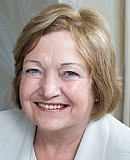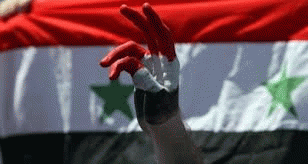After a 10-day (1-11 May, 2013) visit to Lebanon and Syria, leading a 16-person delegation from eight countries, invited by Mussalaha Reconciliation Movement, I have returned hopeful that peace is possible in Syria, if all outside interference is stopped and the Syrians are allowed to solve their own problems upholding their right to self-determination.
An appeal to end all violence and for Syrians to be left alone from outside interference was made by all those we met during our visit to Syria. We have tried to forward it to the International community in our Concluding Declaration.
During our visit we went to refugee camps, affected communities, and met religious leaders, combatants, government representatives, opposition delegations and many others, perpetrators and victims, in Lebanon and Syria.
1. Visits to refugee camps: In Lebanon we visited several refugee camps, hosted by Lebanese or Palestinian communities. One woman said: "before this conflict started we were happy and had a good life (there is free education, free healthcare, subsidies for fuel, in Syria,) and now we live in poverty." Her daughter and son-in-law (a pharmacist and engineer) standing on a cement floor in a Palestinian refugee camp, with not even a mattress, told us that this violence had erupted to everyone's surprise and spread so quickly they were all still in shock, but when well-armed, foreign fighters came to Homs, they took over their homes, raped their women, and killed young males who refused to join their ranks, so the people fled in terror. They said that these foreign fighters were from many countries -- Libyans, Saudis, Tunisians, Chechens, Afghanis, Pakistanis, Emiratis, Lebanese, Jordanians, Turkish, Europeans, Australian -- and these gangs are financed and trained by foreign governments. They attach suicide vests around peoples' bodies and threaten to explode them if they don't do what they are told. One refugee woman asked me "when can we go home?" (To my great delight a few days later in Damascus I met a woman working on a government program which is helping refugees to return to Syria and over 200 have returned to date).
Religious and government leaders have called upon people not to flee Syria and it is to be hoped many will heed this call, as after seeing so many Syrian refugees living in tents and being exploited in so many ways, including sexually, I believe the best solution is the stability of Syria so its people feel safe enough to stay in Syria. If refugees continue to flee Syria then surrounding countries could be destabilized, causing the domino effect and destabilizing the entire Middle East.
Many people have fled into camps in surrounding countries like Turkey, Jordan, or Lebanon, all of which are trying to manage the huge influx of Syrian refugees. Although the host countries are doing their best to cope they are overwhelmed by refugee numbers. (UNHCR's official figure of refugees is one million). Through our meetings we have been informed that Turkey invites Syrian refugees into the country and forbids them to go back home. It is documented that Syrian refugees in Turkey and Jordan are mistreated. Some young Syrian refugee girls are sold for forced marriage in Jordan. From OHCHR reports we know that more than 4 million Syrians are displaced inside their own country, living in great need.
A representative from Red Cross, told us that there is freedom to do their work throughout Syria for all NGO and the Syrian Red crescent in co-ordination with the Ministry of Social affairs and under such dire circumstances, they are doing their best, providing services to as many people as possible. However there is a great shortage of funds for them to cope with this humanitarian tragedy of refugees and internally displaced population. The economic sanctions, as in Iraq, are causing great hardship to many people and all those whom we met called for them to be lifted. Our delegation called for the lifting of these illegal US-led sanctions that target the Syrian Population for purely political reasons in order to achieve regime change.
2. Hospitals: We visited the hospitals and saw many people injured by shootings, bombings, and armed attacks. A moderate Sunni Imam told me how he was abducted by jihadists, who tortured him, cut off his ear, tried to cut his throat, sliced his legs, and left him for dead. He said when he goes back to his mosque they will slaughter him. He told us, "these men are foreign fighters, jihadists from foreign countries, well-armed, well trained, with money, they are in our country to destroy it. They are not true Muslims but are religious extremist/fundamentalists terrorizing, abducting, killing our people." The government spokesman also confirmed that they have in detention captured foreign fighters from 29 countries, including Chechens, Iraqis, and many others. The Ministry of Health showed us a documentary on the terrible killings by Jihadists and the terror caused by these foreigners with the killing of medics and destruction of medical infrastructure of the Syrian State which has made it difficult to answer the needs of the population.
3. Meeting with Opposition: Our delegation participated in an open forum with many representatives of internal opposition's parties. One political opponent who was in prison 24 years under the Assad regime, and has been out for 11 years, wants political change with more than 20 other internal opposition components, but without outside interference and the use of violence. We met with "armed' opposition people in a local community who said they had accepted the government's offer of amnesty and were working for a peaceful way forward. One man told me he had accepted money from Jihadists to fight, but had been shocked by their cruelty and the way they treated fellow Syrian Muslims considering them as not real Muslims. He said foreign Jihadists wanted to take over Syria, not save it.
On May 10, a part of our delegation headed to Homs, invited by the opposition community of Al Waar city where displaced families from Baba Amro, Khalidiyeh and other rebel's strongholds seek refuge. The Delegation saw all the conditions of this city and is studying a Pilot Project for Reconciliation and peaceful reintegration between this community and the surrounded non-rebel communities (Shia and Alaouites) with whom 15 days ago an agreement of non-belligerence has been signed through the auspices of Mussalaha.
4. Meeting with Officials: Our Delegation met, and spoke, at the Parliament, and also with the Governor, Prime Minister and seven other Ministries. We were given details of the new Constitution and political reforms being put in place, and plans for elections in 2014. Government Ministers admitted that they had made mistakes in being slow to respond to legitimate demands for change from civil community but these were now being implemented. They told us when the conflict started it was peaceful for change but quickly turned into bloodshed when armed men killed many soldiers.
In the first days soldiers were unarmed but when people started asking for protection the government and military responded to defend the people and in self-defence.
When we questioned the Prime Minister regarding the allegation that the Syrian Government had used Sarin gas, he told us that as soon as news came from Aleppo that allegedly gas had been used, his government invited immediately the UN to come in to investigate, but heard nothing from them. Most recently however, a UN investigator, High Commissioner Carla Del Ponte, has confirmed that it was rebels, not the Syrian government, who used Sarin gas.
During a meeting with the Justice Minister, we requested that a list of 72 non-violent political dissidents currently detained be released. The Justice Minister said after checking to see if those listed were indeed non-violent political dissidents, he would, in principal, agree to the release of these nonviolent detainees. He also informed us they do not implement the death penalty and it is hoped that when things settle in Syria they will move to have the death penalty abolished. We also asked the Justice Minister (an international lawyer) about the Syrian Government's Human rights abuses, namely the artillery shelling into no-go areas being held by jihadists and armed opposition. The Minister accepted those facts but alleged that the Government had a duty to clear these areas. We suggested there was a better way to deal with the problem than artillery shelling, but he insisted that the government had a responsibility to clear the areas of rebel forces and this was the way in which they were doing it.
The Ministers and Governor said that President Assad was their President and has their support. There were many people we spoke to who expressed such sentiments. However, some young people said they support the opposition but in order to protect the Unity of Syria from outside destruction, they will support the government and President Assad, until the election next year and then they will vote for the opposition. They said the Doha Coalition in Qatar does not represent them and that no one outside Syria has a right to remove President Assad but the Syrian people through the elections next year. The journalists in Syria are in great danger from the religious extremist/fundamentalists, and during my visit to a television station a young journalist told me how his mother was killed by jihadists and he showed me his arm where he had been shot and almost killed.
(Note: You can view every article as one long page if you sign up as an Advocate Member, or higher).






